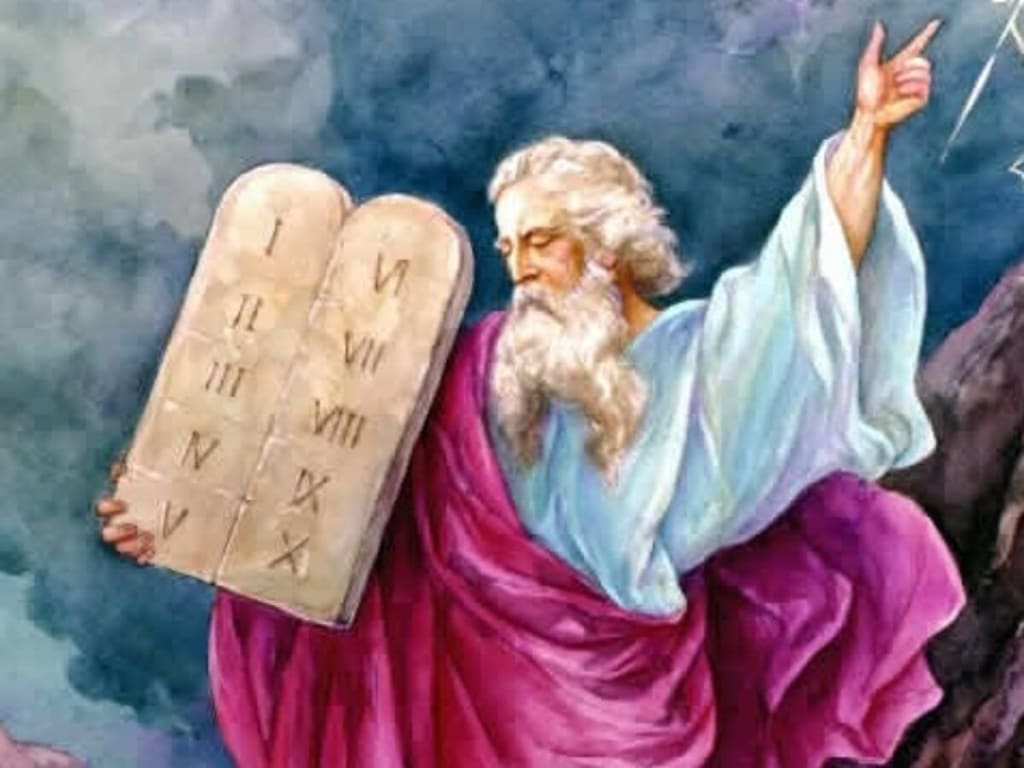The Decalogue
Understanding Its Religious, Cultural, and Ethical Significance

The Decalogue, also known as the Ten Commandments, is a set of religious and moral principles that are central to Judaism and Christianity. These principles are believed to have been given to Moses by God on Mount Sinai, and they form the foundation of the Judeo-Christian tradition. In this article, we will explore the Decalogue, examining each commandment in detail and analyzing its meaning and significance.
1. "You shall have no other gods before me." This commandment prohibits the worship of any other gods besides the God of the Bible. It emphasizes the importance of monotheism and the exclusive worship of one God.
2. "You shall not make for yourself an idol." This commandment forbids the creation or worship of any physical representation of a deity. It underscores the importance of spiritual worship and the rejection of materialism and idolatry.
3. "You shall not take the name of the Lord your God in vain." This commandment prohibits the misuse or disrespect of God's name. It emphasizes the importance of reverent speech and the avoidance of blasphemy.
4. "Remember the Sabbath day, to keep it holy." This commandment emphasizes the importance of rest and worship. It encourages the observance of a day of rest and spiritual reflection.
5. "Honor your father and your mother." This commandment emphasizes the importance of family and the respect for parents. It encourages the values of obedience, gratitude, and familial love.
6. "You shall not murder." This commandment prohibits the taking of human life. It underscores the importance of the sanctity of life and the rejection of violence.
7. "You shall not commit adultery." This commandment prohibits infidelity and sexual immorality. It emphasizes the importance of fidelity and the sanctity of marriage.
8. "You shall not steal." This commandment prohibits theft and dishonesty. It emphasizes the importance of integrity and respect for property rights.
9. "You shall not bear false witness against your neighbor." This commandment prohibits lying and slander. It emphasizes the importance of truthfulness and the avoidance of deception.
10. "You shall not covet." This commandment prohibits envy and greed. It emphasizes the importance of contentment and the rejection of materialism.
Taken together, the Decalogue provides a comprehensive moral framework that emphasizes the importance of God, family, and ethical behavior. It encourages a life of spiritual devotion, honesty, and respect for others. The commandments are still relevant today and provide guidance for individuals and societies seeking to live a moral and just life. The Decalogue is a testament to the enduring power of religious principles and their ability to shape and guide human behavior.
Beyond its religious significance, the Decalogue has also had a profound impact on Western culture. Its principles have influenced legal codes, ethical standards, and social norms. For example, the commandment "You shall not kill" has been a foundational principle in the development of modern legal systems, which recognize the value of human life and prohibit murder. Similarly, the commandment "You shall not steal" has been a key principle in the development of property rights and the recognition of personal ownership.
The Decalogue has also inspired numerous works of art, literature, and music. The commandments have been depicted in countless paintings and sculptures, and have been the subject of numerous literary works, including Dante's "Divine Comedy" and Milton's "Paradise Lost". In addition, the Decalogue has been the inspiration for numerous musical compositions, including Handel's "Messiah" and Bach's "St. Matthew Passion".
Despite its influence and importance, the Decalogue has also been the subject of criticism and debate. Some argue that the commandments are outdated and no longer relevant in modern society, while others have criticized them for their patriarchal and authoritarian undertones. However, many continue to view the Decalogue as a timeless and universal moral code that offers guidance and wisdom to individuals and societies.
The Decalogue is a set of religious and moral principles that has had a profound impact on Western culture and society. Its principles have influenced legal systems, ethical standards, and social norms, and have inspired countless works of art, literature, and music. While it has been the subject of criticism and debate, the Decalogue continues to offer guidance and wisdom to those seeking to live a moral and just life.
Furthermore, the Decalogue has also served as a unifying force within the Judeo-Christian tradition. It has provided a shared set of moral principles that have helped to bind diverse communities together. The commandments have served as a source of guidance, comfort, and inspiration to individuals and groups, and have played a key role in the development and preservation of religious and cultural identities.
However, the interpretation and application of the Decalogue have varied throughout history and across different religious and cultural contexts. While some view the commandments as absolute and unchanging, others view them as adaptable to changing circumstances and evolving social norms. Moreover, different religious and cultural traditions have emphasized different aspects of the commandments, leading to a range of interpretations and practices.
In addition to its religious and cultural significance, the Decalogue also has implications for contemporary ethical and political debates. For example, the commandment "You shall not kill" has been invoked in debates over capital punishment, abortion, and war. Similarly, the commandment "You shall not commit adultery" has been invoked in debates over same-sex marriage and other forms of non-traditional relationships.
Overall, the Decalogue remains an important and influential set of religious and moral principles that continues to shape and inspire individuals and societies. While its interpretation and application have varied throughout history and across different religious and cultural contexts, its enduring relevance and importance are a testament to the power of religious and moral traditions to guide and shape human behavior.
About the Creator
DRD
a asted life
Enjoyed the story? Support the Creator.
Subscribe for free to receive all their stories in your feed. You could also pledge your support or give them a one-off tip, letting them know you appreciate their work.






Comments
There are no comments for this story
Be the first to respond and start the conversation.